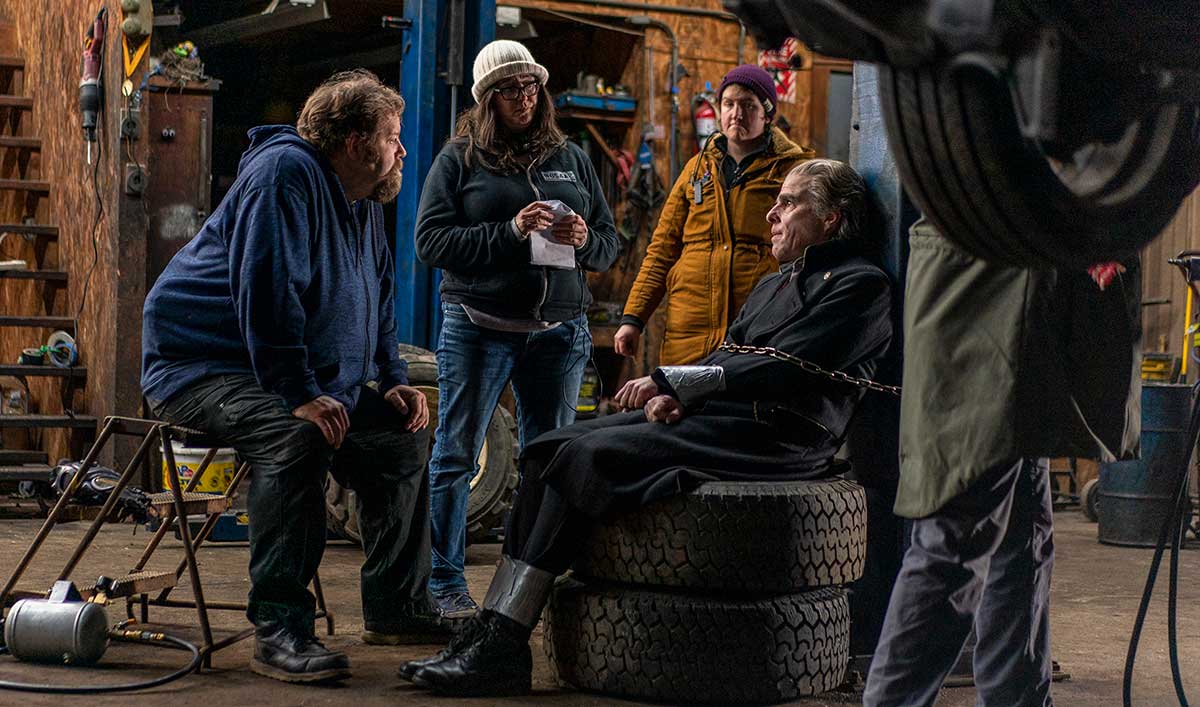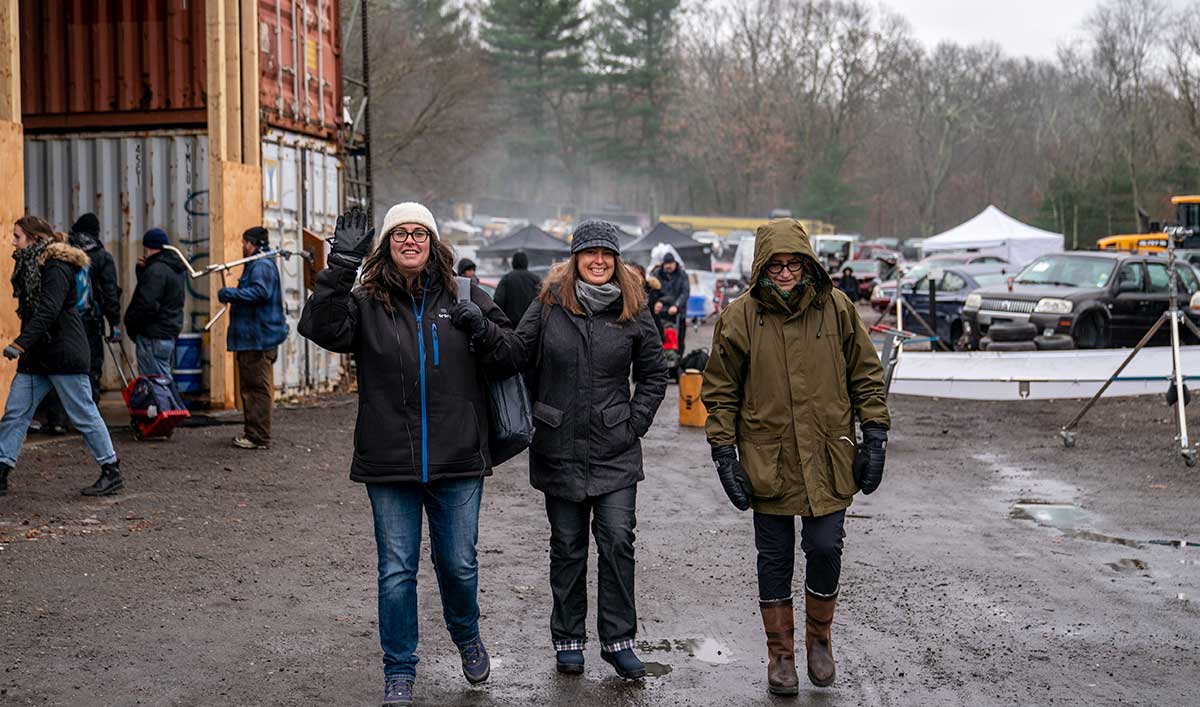NOS4A2 Q&A -- Jami O'Brien (Showrunner, Executive Producer)
Jami O'Brien, the showrunner and executive producer of AMC's NOS4A2, chats with AMC.com about how the writers' room approached crafting Season 2, why the fight against Manx wasn't wrapped up with a nice bow, and the opportunities for more stories in the world of NOS4A2.
Q: This season has a great balance of action and deep character exploration. How did you and the creative team approach Season 2?
A: For Season 1 there was a lot of setup, and building mystery. We set up the worlds, we set up the characters. Certainly the first part of Season 1, in terms of our supernatural story, is largely mysterious. We're meeting Manx. We're seeing he has this car. We're seeing what happens to the kids. We're unfolding the mystery of how this world works. Meanwhile, Manx and Vic are unfolding the mysteries of one another. When Manx first becomes aware of Vic, he doesn't really know what her power is. Vic knows that Manx is scary, but she doesn't really know what his power is. They don't know what one another's weaknesses are. Vic doesn't learn how to defeat Manx until she meets Jolene in Episode 6 of Season 1.
So a lot of the supernatural drama of Season 1 revolves around mystery, whereas when we start in Season 2 -- and the writers and I talked a lot about this -- there's no mystery. We know these guys. They know each other. They know what their powers are. They know what their weaknesses are. So right off the bat we realized that Season 2 was going to be a lot faster and would start off with a lot more gas in the tank. We were like "no stalls." Once Manx is up, he is after Vic. He knows what her weakness is. It is her son, and he is after her. And once Vic knows that Manx is awake, she knows she has to protect her family at all costs.
One of the things that we love about our show is the character drama, so we asked ourselves: how do we keep that from getting lost in the action? We wanted to honor it. The characters are really fascinating. One of the things that drew me to the book, was the nuanced portrayal of a working-class family in Haverhill, Massachusetts, and I didn't want to lose those elements.
I also knew that there was a lot of Charlie Manx's backstory that we wanted to tell. This is the way we talked about it in the writer's room. I'm going to make a bunch of Star Wars references. My favorite Star Wars movie of all time is The Empire Strikes Back, and in the middle of that film, which is obviously a big action movie, we learn about the character drama of Luke and Yoda and Luke and Vader. That's the movie in which we learn that Vader is Luke's father, and there's also a love story unfolding between Princess Leia and Han Solo. All those things are happening as the plot unfolds. So we decided let's try to do that, fold in the character drama into the plot more than we did in Season 1, and make sure that we honor the characters but also keep our foot on the gas the whole time.

Q: During the eight year time jump between Seasons 1 and 2, Vic has adopted the same tendencies that she hated in her parents. Why was it important for you to show that Vic also gets caught up in this cycle?
A: We actually see the beginnings of it in Season 1. When we meet Vic in Season 1, she's a nerdy art kid who doesn't fit in with her peers because she's a bit of a -- I think, you know, Craig's friends call her straight edge. She doesn't drink. She doesn't do drugs. She's never been with a boy. And we meet her when she's pretty inexperienced -- she's 18, but a very young 18. By the end of Season 1, she's drinking. She's getting high with Craig. She has a teenage pregnancy. So she's kind of already on the road to where we meet her in Season 2.
I think it was important to us to honor the family dynamic in the book, because that's one of the things that I think is so beautiful. It was also important for us to mirror what happens in the book and have the supernatural story and the real life story touch on one another. So, yes, Vic is traumatized at the hands of Charlie Manx, but she's also traumatized by growing up where she grew up, with the people that she grew up with. In Season 1, there's a scene where Vic finally confronts her father about his violence and his alcoholism, and part of the reason why she's brave enough to confront him about it for the first time is that she's been tangling with Charlie Manx and that has made her strong. She's also just downed two glasses of beer so she's got a little bit of liquid courage. Chris makes note of that and he says something along the lines of, "I hope you never have to learn what it's like to disappoint the people that you love. If you keep drinking like your old man, I guarantee that you'll find out." I think that moment is a warning to his daughter, but it also turns out to be a bit of a prophecy. Vic falls into a lot of the same traps that her parents fell into, and I think one of the questions for her in Season 2 is will she be able to make a change? Will she be able to grow up and be the parent to Wayne that her parents were unable to be to her?
The other thing that both Vic and Charlie have in common, in addition to trauma in their childhood, is neither one of them is a person of means or resources. Vic comes from a hardscrabble life with not a lot of economic advantages. When we finally meet Charlie as a young man, we see he grew up in poverty, and I think that that's part of what shaped his trauma and part of what shaped who he ultimately became.
Q: By the time Season 2 ends, it seems like the characters have lost everything: family, love, innocence. Why was it important to show that the fight against Manx is so depleting?
A: When you take on a supernatural villain like Charlie Manx, you are going to come out of it with some scars -- both emotional scars and physical scars. We didn't want to tie things up at the end of Season 2 with a neat little bow and suggest that everything's okay now and there's no work left to be done. I think there's still work left to be done for all of our characters, and for me the ending is hopeful, in terms of the McQueens. I love that moment at the end where Vic goes back to the cabinet that we saw her take a bottle of booze from in Episode 3 and go get drunk as a skunk, but this time she sees the bottle, reaches past it, and picks up her art supplies. I feel like there's a suggestion there that one of the bright spots in this world is art and art's ability to help us transcend. That ultimately art can -- I don't know if I want to say art can save us, but I think that it can be part of the equation.

Q: By the end of Season 2, Millie is committed to rebuilding Christmasland. What was the motivation for that choice in her character?
A: I think that Millie had a lot of curiosity about what's on the other side of that veil. Sometimes we make decisions and it's a bit 'be careful what you wish for.' I think it was important for her to become independent from her father, but I think she starts to miss both her dad and, frankly, the power that she had in Christmasland. Wayne says to her 'this real world is kind of stinky,' you know -- 'everybody works all the time and is really tired.' And I think Millie is grappling with whether or not that's something she wants. I think over the course of the season she's fighting to have that choice, and when she gets it it's not as shiny and sparkling as she thought it would be.
Q: Even though Manx is gone at the end of the Season 2 finale, Maggie's foray into the world of thought teases that there are so many new layers to the world of strong creatives. What kind of stories do you think are out there waiting to be told?
A: One of the things that I love about Maggie's storyline is that she ends on a hopeful note as well. When we meet Maggie at the beginning of Season 2, she's what I refer to as an outdoor cat. When we meet her at the beginning of Season 2, she's an indoor cat—she's living this domestic life that she thought that she always wanted, but ultimately I think finds it constricting. Her journey during the second season is partly a journey of choosing the outdoor cat's life again, even though it may disappoint some of the people that she loves. She's really at a high point when we leave her. She's heading into the world of thought, and I think that that's really an exciting hopeful moment for her. In terms of where she goes from there, I think the possibilities are practically endless.
One of the things that Joe does so beautifully in the novel is he implies this greater world that's filled with other strong creatives and other inscapes. Some of them, like Vic and Maggie, are good and use their powers for good, and then some of them are a little bit more like Charlie Manx. So I think that in terms of where Maggie could go, where Vic could go, I think it's a big wide world and there's lots to explore.
Click here to watch the full Season 2 of NOS4A2, available now on amc.com and the AMC app for mobile and devices.
Jami O'Brien joins Zachary Quinto, Ashleigh Cummings, and more cast and creators to break down the destruction of Charlie Manx in this behind-the-scenes video from Season 2.
For more insider perspectives with the NOS4A2 cast and creators, check out this library of interviews with the team in front of and behind the camera: Mattea Conforti explains Millie Manx's choice between freedom and family. Ólafur Darri Ólafsson discusses Bing’s crisis of conscience. Virginia Kull explores Linda’s attempts to bridge the gap between her and Vic. Ashley Romans talks Tabitha’s struggles to fight the supernatural. Jonathan Langdon opens up about how fatherhood shaped his role. Zachary Quinto talks peeling back the layers of Charlie Manx. Ashleigh Cummings explains why Vic is stuck in a cycle of trauma.
For the latest news, sneak peeks, Q&As, videos exclusives, and more, sign up for the NOS4A2 Insiders Club.